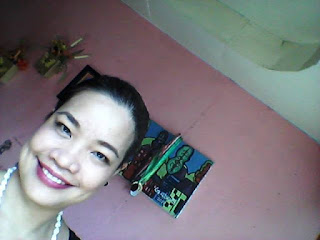I gave campus journalism training and writing workshop to these guys a few weeks back. So nice to see them again yesterday sharing with me the news that they won in four categories at the recent Philippine Information Agency's basic campus journalism seminar. As a parent myself, it is a joy to see young people living out their gifts the best way they can.
How to Write a Good Short Story
by Anabelle Badilla-Gubuan
A short story, simply put, is like a shorter version of a novel.
It has the same elements as a novel has:
the characters, the setting, the plot, the conflict, and the resolution.From
my own experience as a writer, though, a short story will require more
creativity from the author because given the limitations of the number of
words, you have to make sure your readers are satisfied and truly impressed.
Indeed, how do you impress your readers? A short story is a work
of fiction or imagination but then again, just like any other stories long or
short, you can always get inspirations from the reality around you. What people
are looking for usually is how they can relate to the characters, their pains,
their fears, their triumphs and their dreams. Look around you and everything,
everyone, has a story to tell: the beggar in the street, the lonesome willow
tree in the middle of a park, the quarrelling couple in the subway, the strict
librarian with very thick eyeglasses. The list is endless. But before you can
get your hands in these stories, you have to remember a few important things.
1. Have you read enough short stories?
Reading will help you sharpen your mind and develop your skill
as a short story writer. It doesn’t mean that you will be copying the idea of others, though. The more short
stories you read, the more ready you will become to take on the task because it
will build up your excitement and encourage you to actually do it.
2. Outline your story.
When you’re ready to start writing, you can now take your pen
and paper and outline your story. List down the elements I have mentioned above
and make notes next to these elements:
The characters: each character has to leave an impression that
will make the reader remember them long after they have finished reading your
story. Make sure you don’t overwhelm your readers with too many characters.
Some short, compelling stories take over the world by just two or three
characters.
The setting: Describe the scene,
don’t describe the picture.
The plot: it has to have the element of surprise. Putting a twist
somewhere near the end always works.
The conflict: “Human interest” is the aspect of a story that interest people
because it resonates with their own experiences. This always keeps the reader
riveted to their seats simply because they can relate to what the characters
undergo in the story.
The resolution: keep in mind that a good story has an element of justice. It
doesn’t have to be a traditional happy-ever-after kind of ending, but make sure
you make something right out of the conflict you have presented. Some stories
can go on and on, stuck in the conflict of the whole story and it ends badly there.
3. Strong title, equally strong ending.
Your title must represent your whole story but in a way that
will just give a hint to your readers. It is a come on, like teacups placed in
the front porch table. But mind you, making a compelling title is as
challenging as coming up with an ending just as good. Your ending has to make
your story come in full circle.
4. Stick to your story.
When there is a temptation to stray, to back to your outline and
check your elements one by one. It will keep you grounded.
5. Practice, practice, practice.
Capture your reader’s attention. Imagine, visualize, dream, make
it up. Most of all experiment. It is only in trying out new things all the time
that the best writers learn and become best sellers.






No comments:
Post a Comment